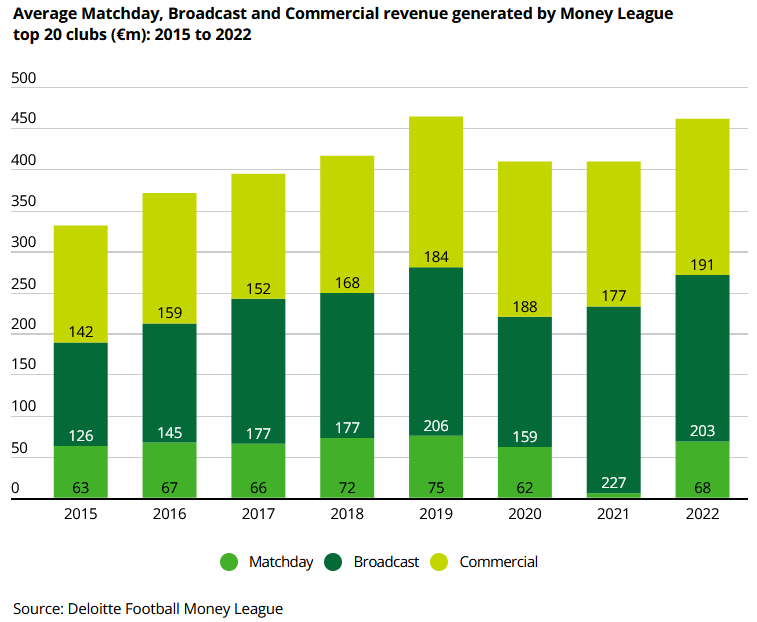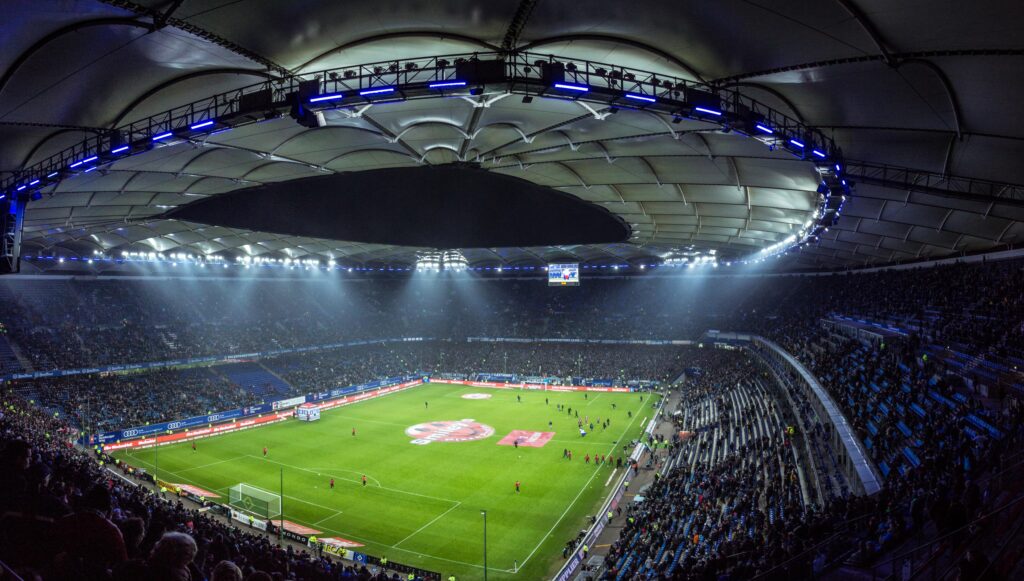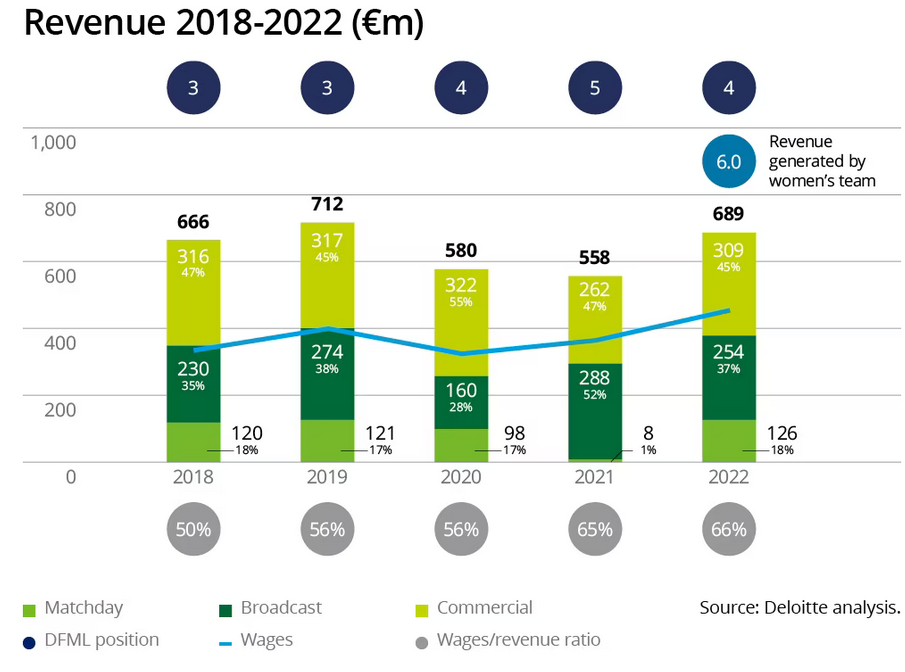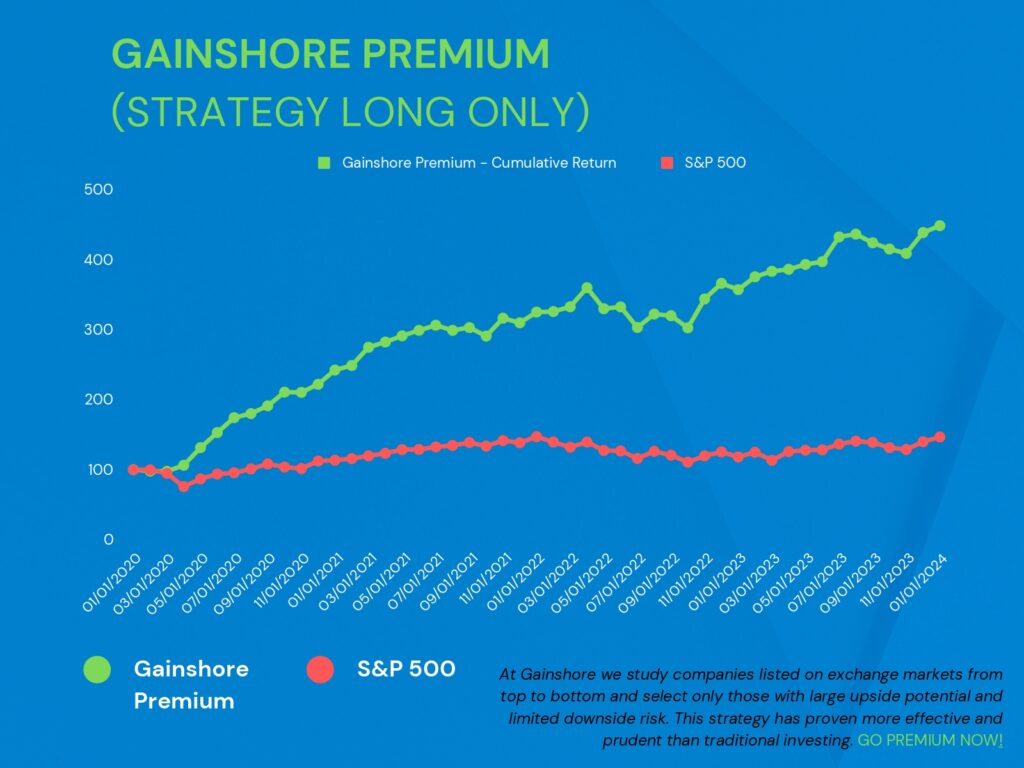Are you a football fanatic who also loves investing? If so, then investing in football stocks might be the winning combination you’ve been waiting for.
Football stocks offer a unique opportunity to align the passion for football and the opportunity to make money by investing in this borderless market. From global football clubs to sports brands and broadcasting companies, there’s a wide range of investment options available. Taking advantage of the immense popularity of football and the potential to generate stratospheric revenue, you don’t have to be an expert investor to tap into such a profitable market.
Professional football, or soccer as they say in the US, is a multi-billion-dollar industry, with huge amounts of money generated and spent every season. However, successfully investing in football stocks requires more than just love for the game; it is not easy to see whether football stocks could be a good investment opportunity and what are the alternatives to profit indirectly from football clubs, how to invest in sponsors of football teams and companies that own television rights to broadcast matches.
In this article, we will reveal how to profit by investing in football, which football club stocks can be easily purchased because they are listed and traded daily in the stock markets and which factors influence the stock price of a football club.
Read also: How to Invest in Formula 1
Table of Contents
Background of the Football Industry
Football is a huge industry that includes not only football teams but an induced of related economic activities ranging from licensing media rights, stadium management, sponsorship and advertising, merchandising, sportswear, video game and sports betting companies, all attracted by a market followed by over five billion people worldwide. Fans support their national team, their local club, national teams, and often even one or more players in particular.
We tend to think that football clubs make money by discovering, buying and selling football players but in reality, teams profit mainly from these three activities:
Broadcasting: global television rights to companies such as Sky Sports and ESPN related to national championships, continental and international competitions.
Cash prizes linked to wins or ranking positions in tournaments in which they participate in.
Commercial: sponsors paid by private companies to the clubs to get their brand in front of the fans; retail, merchandising and product licensing featuring the football club brand.
Matchday: ticket sales to spectators who wish to watch the matches live in the club stadium.

Global Trends and Statistics
Football’s popularity is expanding beyond traditional markets, with growing interest in countries like Emirates, China, India, and the United States. Investing in clubs and brands targeting these emerging markets can offer significant growth potential.
The financial disparity among football clubs has been growing: the top 20 clubs in the world, which are exclusively from Europe’s “big five” leagues, generate a combined revenue of EUR 10 billion; the balance is going up every season.
The gap between national football team strength is on the rise due to higher levels of investment in Europe: no club from outside Europe is ranked in the top 30 revenue generators in global football.
Interest in women’s football is rapidly increasing, particularly in Europe and North America, laying the foundation for achieving higher commercial returns: the average live match audience of the FIFA Women’s World Cup increased by 106%, from 8.4 million in 2015 to 17.27 million in 2019.
Football games are being significantly impacted by new technologies, both on and off the field, from the use of the video assistant referee to the application of electronic performance and tracking systems. While some could argue that new technologies may potentially reduce the beauty of football matches, it is undeniable that games today are fairer and more secure for referees and football players.
Football fans, especially the young, have developed new habits, like watching the games on TV while using a tablet or mobile, fostering the widespread of eSports and live betting and becoming more interested in content pre and post-football matches.
The digital revolution has transformed the way football is consumed and monetized. Streaming platforms, social media, and e-commerce have opened up new revenue streams for clubs and brands. Investing in companies at the forefront of digital innovation can be a strategic move.
https://publications.fifa.com/en/vision-report-2021/the-football-landscape/

In which football clubs can you invest today?
If you are a small investor interested in buying football clubs, your choice is obviously limited to those shares of football clubs that are listed on the stock exchange; shares that are exchanged in public equity markets can be purchased in minutes thanks to the availability of free investment platforms.
However, football clubs often change ownership, with some ending up on the stock market as a result, like Manchester United in 2012 or exiting and others leaving (i.e. delisting) because, for example, they have been fully acquired, such as AS Roma in 2022.
Let’s now take an up-to-date look at the football clubs that are on the stock market:
Manchester United (MANU)
The Manchester Football Club is one of the most recognised teams in football history. Founded in 1878, it was the first English club to enter the European Cup in 1956.
The club’s current record is for the most Premier League titles with 13 wins, as well as the highest number of English top-flight titles with 20.
The stadium where they play at home is Old Trafford, built almost 150 years ago in 1878 it has a seating capacity of about 75,000.
Stocks of Manchester United trade in the New York Stock Exchange (NYSE) with the ticker MANU. Manchester United stocks are currently the most expensive football shares based on ratios like Price/Book, Price/Sale and Enterprise Value/Total Assets.

Juventus Football Club S.p.A. (JUVE.MI)
Also known as “La Vecchia Signora” (The Old Lady), Considered the most successful club of the 20th century, Juventus is also one of the football clubs with the highest number of recent scandals in the Italian league.
The team is based in the city of Turin, counts a fan base of about 30 million and holds the highest number of victories in the Serie A national league: 36 “scudetti” of which 9 won consecutively between 2011-12 and 2019-20.
In 1985, Juventus became the first club in the history of European football to have won all three major UEFA competitions being also the only one to reach it with the same coach.
Juventus Football Club S.p.A. is a subsidiary of the investment group EXOR N.V (EXO.AS). Juventus stocks trade on the Milan Stock Exchange (Borsa Italiana) and are currently overpriced based on a different number of metrics.
Borussia Dortmund GmbH & Co. Kommanditgesellschaft auf Aktien (BVB.DE)
Borussia Dortmund is one of the most famous football clubs in Germany competing in the national premier league Bundesliga.
Borussia Dortmund made its debut as a football team in 1909, rather than as a simple organization, like almost all the clubs in the country at the time. It was founded in 1909 and is considered the second-largest club when it comes to the number of members that joined the club.
Among the absolute records, in 2011-2012 Borussia scored 81 points in a single season which was never done before.
Borussia Dortmund stocks trade on the Deutsche Bourse (Xetra) with the identifier BVB.DE. Borussia Dortmund shows one of the highest asset turnovers among all football stocks, showing the company can use its resources efficiently.
AFC Ajax NV (AJAX.AS)
The Amsterdam-based team named after the legendary Greek hero Ajax the Great, is the most successful club in the Netherlands, winning the Eredivisie title 36 times. It has played in the Eredivisie since the league’s inception in 1956 and is one of the three great clubs in the country to have won the national league along with Feyenoord and PSV Eindhoven, the most important rivals of Ajax.
Ajax went public for the first time in 1998 and is currently listed on the Amsterdam Stock Exchange.
For 10 years until 2020, Ajax has been profitable, sinking back into the red again in 2021 and 2022, despite revenue having never fallen below 100 million euros since 2019. Among its peers, Ajax has the highest ability to pay off its short-term liabilities thanks to solid short-term liquidity assets.
Olympique Lyonnais Groupe (OLG.PA)
The Olympique Lyonnais football club, commonly referred to as Lyon, was initially established in 1950 after a spin-off from the multisport club Lyon Olympique Universitaire formed back in 1896. It is one of the top football clubs on the stock market.
Olympique Lyonnais was owned by businessman Jean-Michel Aulas, who acquired the club on 15 June 1987 and turned it from a second division team into one of the richest clubs in the world.
The company is partially owned by a Chinese equity fund while the majority owner is the American business John Textor who completed the purchase of the club in December 2022.
Lyon stocks trade on the Paris stock exchange as OLG.PA; among the listed companies, the company is one of the most indebted clubs.
S.S. Lazio S.p.A. (SSL.MI)
The Lazio football club was founded in 1900, 27 years before the foundation of the rival AS Roma; Lazio in fact shares the name of the region in which the other main team of Rome is located, in the Italian capital.
Lazio holds the record for consecutive victories in Coppa Italia (7), the best goal scorer in a European match (Simone Inzaghi scored 4 goals in 2000 Lazio-Olympique Marsiglia ending 5-1) and the longest period without taking a goal (754′) with goalkeeper Luca Marchigiani.
Lazio achieved Scudetto and Coppa Italia in the same year (1999-2000), an accomplishment retained in Italy only by Turin, Juventus, Napoli and Inter.
Lazio stocks do not exhibit the best short-term solvency ratios and are one of the football stocks with the lowest valuation.
Parken Sport – FC Copenhagen (PARKEN.CO)
FC Copenhagen’s roots go back to the 1800s; ever since, the club has won numerous awards, including 14 Danish Superliga championships and 8 Danish Cups.
FC Copenhagen stocks trade in Danish krones and are one of the “cheapest football” stocks together with Lazio.

Celtic (CCP.L)
Celtic is the white and green striped shirt top Scottish football club.
Since the Scottish league isn’t as popular as the English Premier League or Serie A, Celtic does not generate revenue from TV rights as much as the other top football teams; its stadium sales account for a large share of income.
Celtic stocks are traded on the London Stock Exchange (LSE).
Futebol Clube do Porto – Futebol, S.A.D. (FCP.LS)
Porto is one of the 4 Portuguese football clubs whose stocks are traded on a public stock exchange.
As of 4 September 2023, Porto has won a total of 84 titles (excluding regional competitions), of which 77 were achieved domestically and 7 were obtained in international competitions. The club’s most recent honour is the 2022–23 Taça de Portugal.
Porto has one of the highest debt levels among all listed football stocks.
Sport Lisboa e Benfica – Futebol, SAD (SLBEN.LS)
Founded on 28 February 1904 as Sport Lisboa, Benfica is one of the “Big Three” clubs in Portugal that have never been relegated from Primeira Liga, along with rivals Sporting CP and FC Porto.
Benfica is nicknamed As Águias (The Eagles), for the symbol atop the club’s crest, and Os Encarnados (The Reds), for the shirt colour.
Sporting Clube de Portugal – Futebol, SAD (SCP.LS)
Best known as simply Sporting, the club is active in several disciplines but owes its fame to its most popular football division which is a top-tier club in the Portuguese division.
It is the third most awards-winning club in Portugal and plays the derby of Lisboa against Benfica.
Sporting Clube De Braga (SCB.LS)
Sporting Braga is not a Lisboa team, but its city is Braga, not far from Porto and the borders with France on the north-west coast of Portugal.
The football players are nicknamed Arsenalistas since in the 1930s, Hungarian coach József Szabó, returning from an Arsenal game he had seen in Highbury, convinced the club to change the colours of the shirt from green to white red. The club is listed at Euronext Lisbon.
Brera Holdings PLC (BREA)
Brera FC is a football club, founded in 2000, which – despite having always remained amateur – is unanimously recognized as «the third team of Milan». Albeit based in Milan, currently the club doesn’t display a team in Italy but rather focuses on a global expansion with 2 teams (soon to be 3) playing in professional leagues in Europe, Africa, Asia and America.
In January 2023 a group of US-based investors listed the company on the Nasdaq Stock Exchange to fund Brera FC’s rich history of ESG-themed projects, as well as its expansion in professional football.
PT Bali Bintang Sejahtera Tbk – Bali United (BOLA.JK)
Bali United is the only football stock available in the South Asian market.
PT Bali Bintang Sejahtera Tbk runs a football team in Indonesia. The company operates through Professional Football Club Management, Sports Agency, and other segments. The company also manages bars, radios, and deals with the retail of in-store sports equipment, as well as non-alcoholic drinks, clothing, management services, business consulting and brokerage.
DON’T YOU KNOW WHERE TO INVEST TODAY?
At Gainshore, we analyse thousands of companies, thoroughly screen the best ones and select only the best of the BEST STOCKS and ETFs, which we constantly monitor. That’s the best way to make informed decisions and preserve capital.
We tell you WHERE WE INVEST OUR MONEY, and if we are wrong, you get the money back. That’s how confident we feel with our winning approach.
Discover now the Best Investments For 2023, or subscribe to our newsletter to learn more.
Football Team Sponsors
Shares of companies that sponsor clubs and large football events and competitions are additional investment options.
Investing in football team sponsor stocks could be a less risky alternative to investing directly in a football team and sometimes the only viable option when it is not possible to acquire shares because the company is privately owned (shares are not listed).
Below are some examples of top edge established companies providing millionaire sponsorship contracts with football teams as well as individual professional footballers:
- Nike (NKE) – USA – Footwear & Accessories: Liverpool, Paris Saint-Germain, FC Barcelona, Chelsea, Tottenham, Atlético de Madrid, Inter Milan
- Adidas (ADS.DE) – Germany – Footwear & Accessories: Real Madrid, Manchester United, Bayern Munich, Arsenal, Juventus, Leicester City, Leeds United
- Puma (PUM.DE) – Germany – Footwear & Accessories: Manchester City, AC Milan, Borussia Dortmund
- Coca-Cola (KO) – USA – Beverages / Non-Alcoholic: Real Madrid, Bayern Munich, FC Barcelona, Tottenham, Juventus, Atletico de Madrid, Borussia Dortmund
- Monster Beverage Corporation (MNST) – USA – Beverages / Non-Alcoholic: Liverpool, Tottenham, West Ham United, Leicester City, Newcastle United
- McDonald’s Corporation (MCD) – USA – Food / Restaurants: Paris Saint-Germain
- Google (GOOGL) – USA – Internet Content & Information: Liverpool, Arsenal
- Spotify Technology S.A. (SPOT) – Luxembourg – Internet Content & Information: FC Barcelona
- BMW (PUM.DE) – Germany – Automotive: Real Madrid, AC Milan
- Volkswagen AG (VOW.DE) – Germany – Automotive: Bayern Munich (AUDI), FC Barcelona (SEAT)
- Stellantis N.V. (STLA) – Netherlands – Automotive: Juventus (JEEP)
- Hyundai Motor Company (005380.KS) – South Korea – Automotive: Atlético de Madrid
- Sony Group Corporation (SONY) – Japan – Consumer Electronics: Manchester City
- Expedia Group (EXPE) – USA – Travel Services: Liverpool
- Trivago (TRVG) – Germany – Travel Services: Chelsea
- eBay Inc. (EBAY) – USA – Internet Retail – Inter Milan, AC Milan
- Marriott International, Inc. (MAR) – USA – Hotels: Manchester United
- Hilton Worldwide Holdings Inc. (HLT) – USA – Hotels: Chelsea
- Axa SA (CS.PA) – France – Insurance: Liverpool
- Allianz SE (ALV.DE) – Germany – Insurance: Bayern Munich, FC Barcelona, Juventus
- American Express Company (AXP) – USA – Credit Services: Paris Saint-Germain
- Deutsche Post AG (DHL.DE) – Germany – Integrated Freight & Logistics: Manchester United
- Electronic Arts Inc. (EA) – USA – Gaming & Multimedia: Real Madrid, Liverpool, Paris Saint-Germain, Chelsea, Tottenham, Juventus, Borussia Dortmund
- Konami Group Corporation (9766.T) – Japan – Gaming & Multimedia: Manchester United, Bayern Munich, FC Barcelona
- Adobe Inc. (ADBE) – USA – Software / Infrastructure: Real Madrid, Bayern Munich
- Canon Inc. (7751.T) – Japan – Computer Hardware: Manchester United
- TeamViewer SE (TMV.DE) – Germany – Software / Application: Manchester United
- Cisco Systems (CSCO) – USA – Communication Equipment: Real Madrid
- QUALCOMM Inc. (QCOM) – USA – Semiconductors: Manchester United
- Standard Chartered PLC (STAN.L) – United Kingdom – Banks: Liverpool
- HSBC Holdings plc (HSBC) – United Kingdom – Banks: Tottenham
- BPER Banca SpA (BPE.MI) – Italy – Banks: Inter Milan
- Ermenegildo Zegna (ZGN) – Italy – Luxury Fashion: Real Madrid
- Daktronics (DAKT) – USA – Electronic Components: Real Madrid
- Abbott Laboratories (ABT) – USA – Medical Devices: Real Madrid
- Pirelli & C. S.p.A. (PIRC.MI) – Italy – Auto Parts: Inter Milan
- Nexen Tire Corporation (002350.KS) – Auto Parts – South Korea: Manchester City
- Ecolab Inc. (ECL) – USA – Water / Specialty Chemicals: Manchester United
- Enel SpA (ENEL.MI) – Italy – Utilities: Inter Milan
- A2A S.p.A. (A2A.MI) – Italy – Utilities: AC Milan
Football Index, ETFs and Investment Funds
For people who like to invest in a basket of many stocks, unfortunately there are not many alternatives to investing in sports.
A football index used to exist in the past but ended up destroying value for its shareholders and was liquidated.
The Roundhill Pro Sports Media & Apparel ETF (MVP), designed to offer investors exposure to sports investments, seems to have been closed as there is nothing available online about this ETF.
As far as we know, there are no investment funds that closely mirror the sports sector, as stocks in the generic entertainment sector open up very different industries to be considered significantly related to the world of football.
Never mind, investing in funds and ETFs is no longer the best available investing option today, read why here.
Interesting Questions and Answers
What are the advantages of investing in Football Clubs and Football Team sponsors?
- Investing in football may be a good source of diversification as sports in general fall outside the traditional economic cycle.
- Football is the most followed sport in the world and generates billions of revenues in any market condition.
- If you are a football expert, the possible trends of certain football teams’ share prices can be more easily predicted based on specific events or news.
- With the growing global fan base and the increasing demand for football-related products and services, investing in football company shares can be a lucrative venture.
What are the disadvantages of investing in Football?
- Stocks of football teams tend to be much riskier than other stock types and are more susceptible to people’s emotions.
- The performance of teams can be affected by various unpredictable factors such as injuries, coaching changes, and player transfers.
- The football stock market has little liquidity, meaning that share trading volumes are lower than traditional stocks; this poses additional risks.
- It is very difficult to evaluate how much a football club is worth based on its financial results.
- Many football clubs’ stocks have historically performed so badly that today trade at such a small value to be considered penny stocks.
What are the main key drivers of a football club’s stock performance?
Financials: the trend of key financial figures like revenue, debt, realized gains and losses from players’ registration rights can highly influence a stock price.
Team results and titles; monitoring a club’s performance, including its league standings, player transfers, and overall team dynamics, is crucial for investors: if the team is playing particularly well in a season and gets a big win, the stock price is likely to go up and vice-versa.
For example, in March 2019, Juventus’ stock price rose 16% after winning against Atletico de Madrid and securing a place in the Champions League quarterfinals of that season. A month later, when Juventus were eliminated from the competition by Ajax, the shares suffered the biggest collapse since 2013.
Arrivals and departures of players, coaches or managers: to give another real case, the dismissal of Jose Mourinho from Manchester United in December 2018 brought down the value of shares by 6%.
Sponsorship and Match Rights: crediting a new sponsor or losing one can mean a lot to a football club’s finances and success, as we are generally talking about millions pouring into the team’s bank account. Moreover, clubs that secure broadcasting deals with major networks stand to benefit from increased exposure and revenue.
Scandals: stock prices of football clubs plummet when players, managers or majority members are involved in controversial events (see the case of Juventus and other teams accused of falsifying their company’s balance sheet).
What are the largest football clubs by market capitalization?
- Manchester United: ~ $3.2 billion
- Juventus: ~ $1.1 billion
- Borussia Dortmund: ~ $550 million
What are the richest football clubs in terms of turnover?
- Manchester City: ~ €730 million
- Real Madrid: ~ €714 million
- Liverpool: ~ €702 million
What Top 10 football clubs had the highest growth during the last football season?
Tottenham (+29%), Liverpool (+27%) and Manchester United (+23%) were the best performers. All the other top 10 football clubs also experienced double-digit growth except for Bayern Munich whose business volume ended up “just” 7% higher than the year before.
Which football team has had the best financial performance in the last 5 years?
Liverpool, Manchester City and Tottenham were the clubs with the largest increase in turnover since 2018: +37%, +29% and +22% respectively.
FC Barcelona and Real Madrid were the worst performers with a negative growth of -5% and -1.5%.
Which football clubs have the highest share of revenue earned from matchday?
Arsenal and Tottenham earnings rely for about 1/4 on matchday ticket sales, compared to only 1/10 for a team like Manchester City.
What football clubs earn the most from broadcasting as opposed to commercials?
From our research, it is found that smaller teams generate most of their revenues thanks to television rights, while the most famous teams get up to half of their profits thanks to sponsors and commercial activities.
Atletico de Madrid, Leicester and Newcastle earn about 70% of their revenue from broadcasting, while the commercial segment accounts for less than 20% of total revenue. On the other hand, clubs like Paris Saint-German and Bayern Munich derive more than fifty per cent of their profits from advertising and sponsors.
What football clubs have the largest fan base?
- Manchester United: ~ 650 million fans
- Barcelona: ~ 450 million fans
- Real Madrid: ~ 350 million fans
Which football club earns the highest income from women’s teams?
FC Barcelona’s revenue from the women’s team stood above 1.2% of the total in 2022, more than doubling most of the top football clubs in the world. Manchester United also ranks well with about 1% of revenue generated by the women’s team in the last year.
Football clubs disburse millions in salaries to footballers every year. Which ones spend the most?
The football club with the most outrageous ratio of players’ wages to revenue is the Paris Saint-German, with a ratio of 111% in 2022, followed by Real Madrid, FC Barcelona and Chelsea, whose salary expense accounted for about 75 of the total revenues. On the opposite side of the spectrum, the British clubs Tottenham and Manchester City allocate “only” about half of their budget on salaries for players.
SOURCES:
https://admiralmarkets.com/education/articles/general-trading/football-trading-strategies
https://www.cmcmarkets.com/en/trading-guides/football-stocks
https://adamfayed.com/15-football-clubs-on-stock-market/
https://en.wikipedia.org/wiki/List_of_Manchester_United_F.C._records_and_statistics
https://en.wikipedia.org/wiki/List_of_Juventus_FC_records_and_statistics
https://it.wikipedia.org/wiki/Statistiche_e_record_della_Societ%C3%A0_Sportiva_Lazio
https://en.wikipedia.org/wiki/Olympique_Lyonnais
https://academic-accelerator.com/encyclopedia/afc-ajax
https://en.wikipedia.org/wiki/S.L._Benfica
https://en.wikipedia.org/wiki/List_of_FC_Porto_records_and_statistics
https://it.wikipedia.org/wiki/Sporting_Clube_de_Portugal
https://brerafc.com/brera-milano/
You should do extensive research and seek financial advice before investing in football-related stocks. Remember that past performance is no guarantee of future results. Additionally, never invest with funds that you cannot afford to lose.







